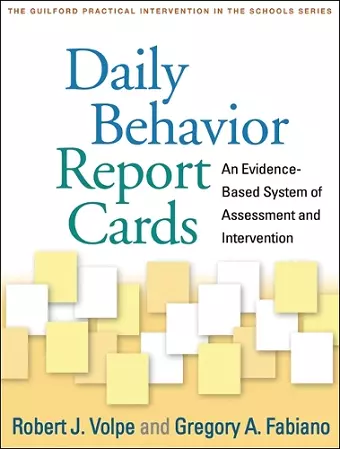Daily Behavior Report Cards
An Evidence-Based System of Assessment and Intervention
Robert J Volpe author Gregory A Fabiano author
Format:Paperback
Publisher:Guilford Publications
Published:18th Mar '13
Currently unavailable, and unfortunately no date known when it will be back

This book presents everything needed to design and implement daily behavior report cards (DRCs), a flexible and dynamic system for promoting positive student behaviors and overcoming barriers to learning. DRCs offer a way to reward K-12 students for achieving clearly defined goals while building school-home collaboration. Teachers can implement the authors' evidence-based approach in just minutes a day, and it is fully compatible with multi-tiered systems of support. In a convenient large-size format, the book includes helpful reproducible forms. Purchasers get access to a Web page where they can download the reproducible forms (and have the option to fill in forms on-screen before printing) plus additional useful tools for charting student progress.
This book is in The Guilford Practical Intervention in the Schools Series, edited by Sandra M. Chafouleas.
"This book is a shining example of translating research into practice. Volpe and Fabiano have successfully met their goal of helping school- and community-based practitioners use DRCs in a highly effective and feasible fashion. DRCs are agile intervention tools that can be individualized for different children or classrooms and that fit into multi-tiered systems of support. Containing clear instructions for implementation, this essential intervention guide should be in the libraries of all practitioners and researchers working with students at risk for academic or behavioral difficulties. It is an important text for graduate-level courses in school-based problem solving and intervention."--George J. DuPaul, PhD, Department of Education and Human Services, Lehigh University
"This book describes a practical and straightforward approach for supporting students with academic and behavior problems. The authors provide step-by-step guidance for assessment, intervention, data collection, and evaluation, as well as home-school collaboration, in a clear and understandable manner. DRCs are valuable tools for structuring, monitoring, and rewarding appropriate classroom behaviors."--Michael George, EdD, Director, Centennial School of Lehigh University
"In an era of increasing demands, diminishing resources, and mounting accountability, Volpe and Fabiano offer an unparalleled resource for school-based practitioners and graduate students. Using a tiered intervention framework, the authors skillfully guide the reader through the process of developing and utilizing DRCs in a way that meets individual students' needs. Practitioners are empowered to use DRCs creatively and effectively. This book will quickly become a 'go-to' resource on practitioners' bookshelves, and I will definitely adopt it for my classes in behavioral consultation."--Joan A. Struzziero, PhD, Department of Counseling and School Psychology, University of Massachusetts-Boston; practitioner/field supervisor, Scituate (Massachusetts) Public Schools
"A phenomenal resource for school practitioners and classroom teachers who are invested in improving students' behavior and performance. The authors provide very specific instructions for how to begin with an assessment, move to a daily report card, and then transition to self-management. Reproducible forms and materials for successful implementation are included, as are numerous helpful examples throughout the chapters. Although the instructions are detailed and specific, they provide the reader with plenty of flexibility to make DRCs work in a wide variety of classroom settings and situations."--Steven W. Evans, PhD, Professor of Psychology and Co-Director, Center for Intervention Research in Schools, Ohio University
"DRCs are an effective, versatile, and virtually free method for school-based intervention, progress monitoring, and school-home communication. Volpe and Fabiano provide detailed procedures for implementing this practice, from screening students to troubleshooting challenges. School personnel will appreciate the reproducible forms in the book and online, plus a wealth of recommendations based on the authors' extensive research."--Kent McIntosh, PhD, Philip H. Knight Chair of Special Education, University of Oregon; Co-Director, Center on Positive Behavioral Interventions and Supports- School social workers working with children of all ages will benefit from reading Daily Behavior Report Cards: An Evidence-Based System of Assessment and Intervention. The authors share theory to enable the reader to understand the construct governing the DRC; however, they primarily focus on the how to, allowing the reader to gain practical knowledge about how to initiate and integrate this evidence-based intervention. An additional strength of the book is a full appendix with reproducible forms described throughout the book and case example to better explain the steps to follow when implementing a DRC. The text is fresh and relevant to both new and seasoned school social workers, building and enhancing the repertoire of evidence-based strategies for supporting students.--School Social Work Journal, 6/1/2014
ISBN: 9781462509232
Dimensions: unknown
Weight: 318g
130 pages